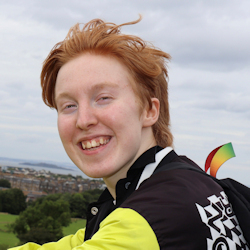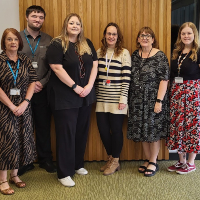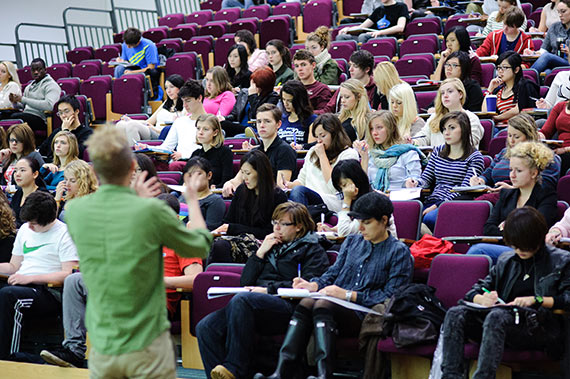View semester dates

BA (Hons) Social and Political Sciences
Use expertise from three world class departments to understand the pressing social and political issues of our time
Year of entry: 2026/27
View semester dates
BA Social and Political Sciences allows you to study a flexible choice of modules from a huge range offered by three highly respected academic departments.
You'll be taught by world-leading academics and study the most up-to-date theories in social and political sciences. As your studies progress you'll have the flexibility to tailor your degree to allow you to focus on your own interests, whether that's globalisation, human rights, the future of the welfare state, migration, equality or social justice.
You'll also be encouraged to take up an internship or work placement in which you'll get first-hand experience of the work you're interested in.
Course content
You'll start by studying core issues in social and political sciences. You then go on to choose from a wide range of modules offered across Politics, Sociology and Social Policy. You can study a varied range of modules across the three years, and take modules from different departments using a highly interdisciplinary lens. These topics might include:
- Political discontent
- Social inequalities
- Global (in)justice
- The welfare state
- Human rights
- Immigration
- Cultural identities
Year 1
Your first year will provide a strong foundation in politics, sociology and social policy. You'll take introductory modules across the three departments, which provides you with a strong interdisciplinary grounding.
Core modules
- Power, Policy and Social Progress
- Political Analysis
- Social Evils in the Chocolate City
- Theorising the Social World
- Contemporary Issues in Social and Public Policy
Option modules
You will also study one option module. In previous years, options have covered topics such as:
- Understanding Self in Society
- Introduction to Political Theory: States, Liberty and Revolution
- Criminal Justice and Inequality
- The Psychological Mind in a Social World
- Social Harm and Injustice
- Introduction to International Politics: Global Hierarchies and Global Orders
- York Policy Lab
Academic integrity module
In addition to the above you will also need to complete our online Academic Integrity module.
Year 2
You'll study our core interdisciplinary module and have the flexibility to choose from a wide range of option modules. You'll need to study at least one module from each of the three departments during your final two years.
Core modules
Option modules
You will also study four option modules. In previous years, options have covered topics such as:
Department of Sociology
- Health and Illness
- Humans and Other Animals
- People and the State
- Popular Culture, The Media and Society
- Social Interaction and Conversational Analysis
- Societies and the Climate Crisis
- Gender Sexuality and Inequalities
- Body and Society
- Urban Pasts and Futures
- Working in the Criminal Justice System
Department of Politics
- Election and Voting Behaviour
- Human Rights and Wrongs
- Politics of Development
- War and Peace
- State, Economy and Society
- The Politics of Gender
- Politics in the UK
- The US and Global Politics after the Cold War
- The Rising Powers
- Critical Global Security Studies
School for Business and Society
- Policy Think Tank
- Crime and the Life Course
- Contemporary Issues in Criminal Justice
- Communities, Participation and Creating Change
- Enabling Places and Spaces: Exploring Social Perspectives on Disability and Mental Health
- Social Inequalities
- Victimology and Victimisation
- Future Worlds of Work
- Left Behind Places
- Global Social Problems
- Crime and Justice in the Online Space
- Stigma, Power and Resistance
Year 3
Core module
You will engage in independent research in social and political science. You’ll work closely with a personal academic supervisor who will help to guide your research and keep your project on track, helping you to develop valuable transferable skills for future research and careers.
Option modules
You will also study four option modules. In previous years, options have covered topics such as:
Department of Sociology
- Crime, Media and Culture
- Global Transformation of Health
- Crime, Gender and Sexuality
- Morbidity, Culture and Corpses
- Spiritual Realities
- Talk at Work
- Working in the Criminal Justice System
- The Racial State
- AI in Society
Department of Politics
- Africa and International Politics
- Constitution and Territorial Ideologies in Britain and Ireland
- India and its Neighbourhood
- Democracy and Emergency
- Development Paradigms
- Morality and Modern Warfare
- Governmentality: Michel Foucault and the Analytics of Power
- Green Politics
- International Crisis Diplomacy
- Political Psychology and Public Opinion
- Politics of Peace after Civil War
- The Global Food System
- Global Politics of Nuclear Weapons
- Global Sustainability and Energy Policy
- Political Transition in the Middle East: A Century of Conflict
- The Labour Party and Socialism
- The Politics of (Post-) Colonialism
- Politics of the Middle East: Regimes and societies in Transition
- Karl Marx
- Border Politics: Contemporary Perspectives on Sovereignty, Mobility and Citizenship
- The Racial State
- AI in Society
School for Business and Society
- Drugs: Prevalence, Policy and Practice
- Welfare States in Crisis
- Policing and The Police
- Housing and Homelessness: Overcoming Inequality
- Prisons and Penal Policy
- Wellbeing of Children and Young People
- Vulnerability, Deviance and Social Control
- Migration, Immigration and Social Policy
- Gender, Violence and Justice
- Environmental Justice, Harm and Policy
- Education Policy: Divisions and Equalities
- Left Behind Places
- Global Social Problems
- Crime and Justice in the Online Space
- Stigma, Power and Resistance
Our modules may change to reflect the latest academic thinking and expertise of our staff, and in line with Department/School academic planning.
Learning outcomes
Every course at York has been designed to provide clear and ambitious learning outcomes. These learning outcomes give you an understanding of what you will be able to do at the end of the course. We develop each course by designing modules that grow your abilities towards the learning outcomes and help you to explain what you can offer to employers. Find out more about our approach to teaching and learning.
Learning outcomes for this course
- Draw on politics, social policy and sociology to develop critically-reasoned and analytically coherent contributions to our collective understanding of emerging local, national and global issues and the changing social and political world
- Engage with and demonstrate a high level understanding of a broad range of social scientific theories and research in order to understand and offer critical reflections on the major challenges confronting nations and our world.
- Design and undertake research projects that draw upon appropriate research techniques to investigate global issues, nation states, societies and/or individuals.
- Operate as resourceful, self-directed professionals and researchers equipped with the demonstrable ability to learn and develop a broad range of social scientific skills.
- Synthesise and communicate complex information and arguments to diverse audiences in appropriate formats.
- Communicate ideas effectively and sensitively in a way that promotes equality and celebrates diversity and is respectful of the views, values and cultural position of others.
- Work collaboratively, constructively and creatively in teams in a manner which values difference and recognises diverse needs, views and values

The interdisciplinary nature of Social and Political Sciences has equipped me with both a theoretical and an applied understanding of the social sciences. I've found the varied assessment methods, not just essays and exams, but also blogs, policy reports, and portfolios, to be refreshing and helpful to my employability. I thoroughly enjoy this fascinating degree and the vast range of module choices it offers, which means you can really tailor it to your interests!
Stella, BA Social and Political Sciences
Fees and funding
The fees and funding information here is for students starting in the 2026/27 academic year.
If you take a year abroad or year in industry you'll pay a reduced rate of fees for that year.
Annual tuition fees
| UK (home) | International and EU |
|---|---|
| £9,535 (TBC) | £26,900 |
The UK government has announced its intention to increase tuition fees from £9,535 to £9,790 for the 2026/27 academic year. We expect this to apply to new UK (home) undergraduate students starting their studies in September 2026.
UK (home) or international fees?
The level of fee that you will be asked to pay depends on whether you're classed as a UK (home) or international student. Check your fee status.
Fees for subsequent years
- UK (home) fees may increase within the government fee cap in subsequent academic years. We will notify you of any increase as soon as we can.
- International fees are subject to increase in subsequent years in line with the prevailing Consumer Price Index (CPI) inflation rate (up to a maximum of 10%).
More information
For more information about tuition fees, any reduced fees for study abroad and work placement years, scholarships, tuition fee loans, maintenance loans and living costs see undergraduate fees and funding.
Additional costs
Although students may decide to purchase some textbooks or other resources, we have an extensive physical and electronic library, so that there is no requirement to do so.
Funding
We'll confirm more funding opportunities for students joining us in 2026/27 throughout the year.
York, Oxford, Cambridge, Imperial
Just four UK universities are rated Gold for teaching and top ten for research* in the latest national assessment exercises.
* Awarded joint 10th in the Times Higher Education ranking of the Research Excellence Framework 2021.
Teaching and assessment
You’ll study and learn with academics who are active researchers, experts in their field and have a passion for their subjects. Our approach to teaching will provide you with the knowledge, opportunities, and support you need to grow and succeed in a global workplace. Find out more about our approach to teaching and learning.
Teaching format
You'll attend a mix of lectures, small group seminars and workshops, with an increasing emphasis on independent work in later stages. You'll actively select what you want to learn, and be supported by your teaching staff in exploring these issues in greater depth.
- You'll be taught by world-leading academics from each of the three departments.
- Our research-led teaching means you can focus on the latest ideas and debates.
Timetabled activities
In your first year, you can expect:
| Lectures | 6-7 hours per week |
|---|---|
| Seminars | 5-6 hours per week |
| Workshops | 0-4 hours per semester |
These figures are representative of a typical week. Your contact hours will vary throughout the year due to your module choices, non-compulsory classes, exam periods and changes to scheduled activities.
Outside your timetabled hours, you'll study independently. This may include preparation for classes, follow-up work, wider reading, practice completion of assessment tasks, or revision.
In the UK, full-time students are expected to spend 1,200 hours a year learning. That's about 40 hours of classes and independent study each week during semesters. Everyone learns at a different rate, so the number of hours you spend on independent study will be different to other students on your course.
Teaching location
You will be based at the School for Business and Society on Campus West. Most of your teaching will take place nearby.
About our campus
Our beautiful green campus offers a student-friendly setting in which to live and study, within easy reach of the action in the city centre. It's easy to get around - everything is within walking or pedalling distance, or you can use the fast and frequent bus service. Take a campus tour.
Assessment and feedback
Assessment will be by a mixture of essays, projects and examinations. In your third year you'll do a 8,000-word dissertation on a subject you want to investigate and you'll construct the questions you want to answer under the supervision of a tutor.
- You'll receive a report with feedback on your work for every module.
- You'll be assigned a supervisor who will give academic and pastoral support.
Careers and skills
The flexible nature of this degree also makes it a good springboard to postgraduate study across specialist areas in Social and Political Sciences.
Career opportunities
Graduates go on to a wide variety of careers across the public and private sectors including:
- Public administration and civil service
- Policy organisations
- Charities
- Non-governmental organisations
- Local government
- Social research
- Teaching
- Business and finance
See our graduates' careers in roles around the world
Transferable skills
- Problem solving
- Organisation and time management
- Communication Teamwork
- Debating and persuasion
- Leadership
- Creativity
- Resilience

Social and Political Sciences offers students a chance to explore a breadth of disciplines and topics, which is perfect for those with an interest in the social sciences as a whole. As the years progress, we can narrow down our focus and make the degree our own through the wide range of choices we are given! I have loved studying this course and would recommend it highly. It is perfect if you're looking for variety, all while addressing pressing social and political issues of our time.
Bonnie, BA Social and Political Sciences.
Entry requirements
| Qualification | Typical offer |
|---|---|
| A levels | AAB |
| Access to Higher Education Diploma | 36 credits at Distinction and 9 credits at Merit or higher |
| BTEC National Extended Diploma | DDD |
| European Baccalaureate | 80% overall |
| International Baccalaureate | 35 points |
| T levels | We will consider a range of T Level qualifications for entry. Please visit our dedicated T Levels page for a full list of accepted T Levels. |
| Scottish Highers / Advanced Highers | Scottish Highers - AABBB Advanced Highers - not required for entry We may also be able to consider three Advanced Highers or a combination of Highers and Advanced Highers, where an applicant does not meet the grade requirement through Highers alone. Please contact us to discuss your qualifications. |
| International foundation programme | Foundation Certificate from our International Pathway College or an appropriate alternative. |
| Other international qualifications | Equivalent qualifications from your country |
Alternative offers
Meeting the following additional criteria may qualify you for an alternative offer.
| Criteria | Adjustment |
|---|---|
| Widening participation | BBC This is conditional upon successful completion of the WP programme including the YorJourney module (Black Access Programme, Next Step York) or successful completion of Realising Opportunities More about widening participation. |
| Contextual offer | BBB |
| EPQ | If you achieve C or higher in the EPQ, you may be eligible for an alternative offer up to one A level grade (or equivalent) below our typical offer. |
| Core Maths | If you achieve B or higher in Core Maths, you may be eligible for an alternative offer up to one A level grade (or equivalent) below our typical offer. |
English language
If English isn't your first language you may need to provide evidence of your English language ability. We accept the following qualifications:
| Qualification | Minimum requirement |
|---|---|
| IELTS (Academic) | 6.5, with a minimum of 6.0 in each component |
| IB English | A score of 4 in English A or 5 in English B (Higher Level or Standard Level) |
| Cambridge CEFR | 176, with a minimum of 169 in each component |
| Oxford ELLT | 7, with a minimum of 6 in each component |
| Oxford Test of English Advanced | 136, with a minimum of 126 in each component |
| Duolingo | Integrated subscores: 120 overall, with a minimum of 105 in each component |
| GCSE/IGCSE/O level English Language (as a first or second language) | Grade C / Grade 4 |
| LanguageCert SELT | B2 with a minimum score of 33/50 in each component |
| LanguageCert Academic | B2 with a minimum score of 33/50 in each component |
| Kaplan Test of English Language | 478 Main Flight score with 444 in each component |
| Skills for English | B2: Merit overall, with Pass with Merit in each component |
| PTE Academic | 61, with a minimum of 55 in each component |
| TOEFL | 87 overall, with a minimum of 21 in each component (taken before January 2026) 4.5 with 5 in Listening and 4.5 in each other component (taken after January 2026) |
| Trinity ISE III | Merit in all components |
| Other English language qualifications | We also accept other English Language qualifications, including various school-leaving certificates. |
For more information see our undergraduate English language requirements.
If you haven't met our English language requirements
You may be eligible for one of our pre-sessional English language courses. These courses will provide you with the level of English needed to meet the conditions of your offer.
The length of course you need to take depends on your current English language test scores and how much you need to improve to reach our English language requirements.
After you've accepted your offer to study at York, we'll confirm which pre-sessional course you should apply to via You@York.
Next steps
Contact us
Get in touch if you have any questions

Department
Related courses
Discover York








